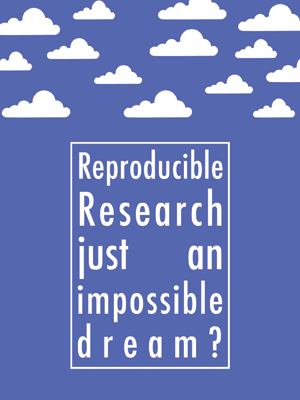Reproducible research – an impossible dream?
Posted on 21 March 2014
Reproducible research – an impossible dream?
 By Kenji Takeda, Microsoft Research.
By Kenji Takeda, Microsoft Research.
Research results in peer-reviewed publications are reproducible, right? If only it was so clear cut. With high profile paper retractions and pushes for better data sharing by funders, publishers and the community, the spotlight is now focussing on the whole way research is conducted around the world.
While research software provides the potential for better reproducibility, most people agree that we are some way from achieving this. It’s not just a matter of throwing your source code online. Even though tools such as Github provide excellent sharing and versioning, it is down to the researcher and developer to make sure the code can not only be re-run, but also understood by others. There are still technical issues to overcome, but the social ones are even harder to tackle. The development of scientific software, choices by researchers, its use and reuse, are all intertwined. We at Microsoft Research are concerned with this: see Troubling Trends in Scientific Software.
The theme of software in reproducible research for CW14 in Oxford couldn’t be more timely, and I’m very excited to be taking part in this dynamic event again. The unconference format is perfect for exploring the many issues around reproducible research and software. CW14 is unique in bringing together like-minded innovators from a broad spectrum of the research world, unlike many more conventional conferences. And it’s more than just a talking shop. We’ve seen real action come from previous events, such as changing lives through the Research Software Engineers initiative. What started out in sessions airing many of the frustrations of software-focussed people in universities, has now made it onto the international agenda on e-Infrastructure.
I’m especially interested in how cloud computing is enabling new approaches to scientific reproducibility as part of our Azure for Research programme, and will be talking about three important projects in my session:
- Recomputation.org is ground-breaking in its use of virtual machines to preserve software experiments. It’s a great collaboration with the Software Sustainability Institute and we’re looking forward to engaging with everyone at CW14.
- Patrick Henaff from IAE de Paris, working with Zeliade Systems, on enhanced IPython notebooks shared via the Cloud. Their vision for social coding around reproducible software is tackling some of the cultural issues in research.
- Open biological science, open protocols, and provenance preserving analyses in the cloud are all part of Titus Brown’s pioneering work at Michigan State University.
Hacks of Reproducibility
We’re particularly excited by the Hack Day, which we hope will focus everyone’s energy and creativity through code. Rather than everyone just heading home after two days of intense discussion, people can stay and instantiate their ideas in practice. This could be extending existing efforts, like Recomputation.org and IPython, or experimenting with completely new ideas. With Github supporting CW14 and the Hack Day, we’re sure that you’ll be able to come up with some great results.
To help, all participants in the Hack Day will receive a six-month Windows Azure pass to use the Cloud, and continue to develop projects afterwards. Even better, one team will receive 8 inch Windows 8.1 tablets, complete with a capacitive stylus for apps like OneNote. So get your thinking caps on, warm up those fingers, and come along for two days of unrivalled discussion and the chance to bring your ideas on reproducible research to life during the Hack Day. I look forward to meeting you at CW14 on 26-28 March, and online on LinkedIn & Twitter (@azure4research), to see if cloud computing can help you with your research - www.azure4research.com.
